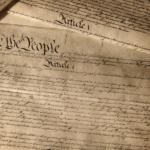“Most glorious is the City of God: whether in this passing age, where she dwells by faith as pilgrims among the ungodly, or in the security of that eternal home which she now patiently awaits until ‘righteousness shall return into judgment’ . . .” It is with these words that Augustine famously begins the City of God. And yet what are we to make of them? What exactly is he glorifying, and why? And what political wisdom do they contain for us today?
Given Augustine’s reputation for polemics, it would be unsurprising if his readers interpreted these lines as a celebration of his city’s impending victory over its enemies, and in some ways, it is. Yet, not in the way that we would expect. Instead, Augustine’s opening lines subvert tribal triumphalism. To put this more plainly, Augustine glorifies the city of God as God’s city, and not as the Romans glory in theirs, which of course, is as theirs. Rather than glorying in a Rome that has conquered all, Augustine glories in the city of God as a gift offered to all, and extends the invitation as far as he can.
This message about the city of God, compacted as it is in the tome’s opening lines, also has important implications for Christian political engagement today. In brief, it shows us the ways we must be transformed in order to properly engage in politics. While the best way to make this case would be to embark on a thoroughgoing analysis of the entire City of God, as I try to do in Politics and the Earthly City in Augustine’s City of God, perhaps it is sufficient to look at the aforementioned lines in light of the argument that unfolds in Book One.
Amor Dei and Humility
Start your day with Public Discourse
Sign up and get our daily essays sent straight to your inbox.Doing so, we find that Augustine’s project in City of God is to show his readers that the distinction between self-love and love of God is a distinction with a difference. Thus, rather than another form of veiled self-praise, the book’s opening lines are meant as an exclamation of praise rooted in gratitude—a gratitude into which all readers are invited. As I argue more extensively in my book, Augustine presents this gratitude as the fruit of our participation in the very love of God that binds the city of God together.
Importantly, for Augustine, love of God is not simply our love for God—which is always imperfect—but God’s love for us, which we receive and return in (hopefully) ever greater degrees. By locating the glory of God’s city in this love, Augustine undercuts our ability to boast in ourselves, since this love is not originally ours, but God’s. We participate in it only insofar as it is given to us, despite our sinfulness. This to say, because Augustine presents love of God as something originating in God, he reveals the contradiction within all our efforts to present our membership in the city of God as something that we earned or as proof that we are already good. Worried that we easily forget this, Augustine repeatedly characterizes the city of God on pilgrimage as a mixed body—mixed not just in the sense of having good and bad members, but also in the sense of there being good and bad motives in each member’s heart. For Augustine, in other words, we must constantly be reminded that the pilgrim city is marked not by its moral perfection, but by its willingness to receive and return to God. Such a city leaves little room for triumphalism.
This being so, it is unsurprising that Augustine uses Book One to show that entering the city of God means to be increasingly divested of a false sense of superiority. Augustine uses the sack of Rome to show that the purpose of his “two cities” template is to bring each of us deeper into the city of God. At bottom, therefore, the City of God is designed to convince us of the necessity of letting God work on our hearts. If we, his readers, tend to assess ourselves and others through the eyes of pride, and are therefore prone to misread the city of God in the earthly city’s terms, Augustine’s task is to communicate the real difference between the two cities, their two loves, and their two modes of glorying. Even the pilgrim church must re-learn this lesson from time to time, as the temptation to glory in itself remains ever-present.
Augustine repeatedly characterizes the city of God on pilgrimage as a mixed body—mixed not just in the sense of having good and bad members, but also in the sense of there being good and bad motives in each member’s heart.
Enemies of God’s City
Augustine’s discussion of the enemies of God’s city in Book One offers a rebuke to our temptations of self-glory. While Rome strives to draw thick boundaries between itself and its barbarian enemies, Christ extends friendship toward all. In noting that many former enemies have corrected their errors before adding that many still remain enemies, Augustine emphasizes his agnosticism about who, in the end, will be a friend of God. Augustine is unwilling to give up on anyone—even his harshest critics. Famously, he writes,
We have less right to despair . . . when some predestined friends, as yet unknown even to themselves, are concealed among our most open enemies. In truth, those two cities are interwoven and intermixed in this age, and await separation at the last judgment.
Though Augustine uses the language of enemies here, it is evident that he also considers himself obligated to think of these enemies as the future friends they could be—those whom Christ loved first (Rom. 5:8). This framework doesn’t destroy enmity, but it does transform his response to enemies.
Augustine’s response to enemies is also shaped by his view of how God conquers them. For Augustine, the human heart is not conquered by God in a military sense, but in a spousal sense. Human beings aren’t coerced by God, but rather won over by Him. Upon discovering God’s favor and goodness, we respond in freedom and in love. God wishes for His enemies’ friendship, and, Augustine suggests, we should too.
Nevertheless, Augustine is mindful of how difficult it is to seek our enemies’ friendship. Countenancing the question of an imaginary Christian interlocutor who asks, “Why does God bless the ungrateful?” Augustine’s preliminary answer is clear, if not unsurprising: God’s ways are not our ways. While we are caught in the webs of parsing out who deserves what, God makes the sun shine on all, regardless of their gratitude. His fuller answer speaks to this interlocutor’s indignation, which really asks, “How is this fair? We are faithful to God and follow His laws, so why does God bless our enemies and allow us to suffer?” To these objections, Augustine replies, “God’s patience still invites the wicked.” God, in other words, does not give up on us even after we give up on each other. Every blessing given to another person invites their gratitude and ours, and should therefore be celebrated. To be struck by this is to experience, Augustine hopes, a paradigm shift, or at least the glimpse of its possibility.
There is, however, another way in for Augustine’s indignant interlocutor: God still gives us good things despite our ingratitude. He remains patient with us amid our presumption. For Augustine, our outrage at God’s beneficence to the ungrateful reminds us that, insofar as we feel it, we remain to some degree bound by the same sinfulness we scorn in others. Thus, when Augustine concludes that “God’s mercy embraces the good for their cherishing, just as his severity chastises the wicked for their punishment,” he is really implying that we must interrogate those places where we resist God’s mercy, whether they involve mercy towards ourselves or others.
God still gives us good things despite our ingratitude. He remains patient with us amid our presumption.
Beyond Facile Sorting
Augustine’s goal is to resist a facile sorting of the good from the bad, and so to remind his Christian readers that their own transformation is far from complete. Rather than trying to deduce why others receive what they do or do not deserve, he directs his readers’ attention to the question of how they ought to meet their own sufferings. The good but imperfect person is tested and cleansed by suffering in order to be humbled, purified, and healed. All told, in Augustine’s account, the goodness open to humanity is very much a goodness in process—and a process very much in God’s hands.
In the end, all this means that Augustine’s account of the earthly city resists a certain kind of application. It resists becoming a rubric by which we can justify imputing the basest of motives—the motives of the earthly city—to our enemies. Why? Because it indicts us of pride when we do so. To put it another way, Augustine wants us all to be liberated from the seductive clutches of the earthly city. Since no one is fully free from its corruptions, it can’t serve as a weapon against “the heathens” without profound hypocrisy.
The project of Christian political engagement, therefore, cannot be to prematurely sift the wheat from the chaff, but to work for earthly peace in humility, and to confess the city of God in love. Only in this way can our attempts to counteract the injustices of the earthly city be truly fruitful; only in this way can they bear witness to the limits of the earthly city’s political imagination.
Note from the author: Some of this argument is taken from my book, Politics and the Earthly City in Augustine’s City of God (Cambridge University Press, 2020). Reprinted with permission.














